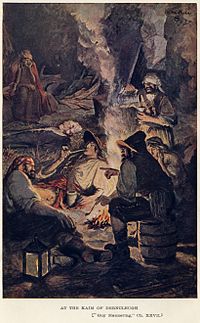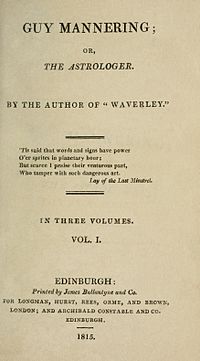- Guy Mannering
-
Guy Mannering or The Astrologer 
"At the Kaim of Derncleugh: Guy Mannering Chapter XXVII", by N. M. Price. (c. 1895)Author(s) Sir Walter Scott Country UK Language English, Lowland Scots Series Waverley Novels Genre(s) Historical novel Publisher Longman, Hurst, Rees, Orme, and Brown, London; and Archibald Constable and Co. Edinburgh Publication date 1815 Media type Print (Hardback & Paperback) Pages 3 vol.; [4], 341, [1]; [4], 346, [2]; [4], 358, [2] Preceded by Waverley Followed by The Antiquary Guy Mannering or The Astrologer is a novel by Sir Walter Scott, published anonymously in 1815. According to an introduction that Scott wrote in 1829, he had originally intended to write a story of the supernatural, but changed his mind soon after starting. The book was a huge success, the first edition selling out on the first day of publication.[1]
Contents
Plot introduction
Guy Mannering is set in the 1760s to 1780s, mostly in the Galloway area of southwest Scotland, but with episodes in Cumberland, Holland, and India. It tells the story of Harry Bertram, the son of the Laird of Ellangowan, who is kidnapped at the age of five by smugglers after witnessing the murder of a customs officer. It follows the fortunes and adventures of Harry and his family in subsequent years, and the struggle over the inheritance of Ellangowan. The novel also depicts the lawlessness that existed at the time, when smugglers operated along the coast and thieves frequented the country roads.
Plot summary
Guy Mannering, after leaving Oxford, had been Mr Godfrey Bertram's guest on the night of his son's birth, when he made acquaintance with Dominie Sampson, and with Meg Merrilies, who came to tell the infant's fortune. The young student, however, offered to do this from the stars, and predicted that three periods of the boy's life would be very hazardous. Five years afterwards he was kidnapped while riding with Kennedy, whose dead body was found on the beach; and the same night, after giving birth to a daughter, Mrs Bertram left her husband a widower.
Sixteen more years had elapsed when Colonel Mannering returned from India just in time to be present at his friend's death, and Glossin, who had been concerned in Harry's abduction, became the possessor of the Ellangowan estate. Lucy and the dominie accepted the hospitality of Mr and Mrs MacMorlan; but the colonel, having learnt from Mr Mervyn, at whose house his daughter was staying, that she had a lover, who afterwards proved to be Brown, hired a house in the neighbourhood of Kippletringan, and invited Miss Bertram to be Julia's companion, and the tutor his librarian.
As he was following Miss Mannering to Scotland, the smuggler Brown, whom the colonel believed he had shot in a duel in India, dined with the farmer Dinmont at an inn, where he also met Meg Merrilies, who recognised him; and, having rescued the farmer from some robbers, he spent a few days at his house. Proceeding on his journey, he came to a ruined hut, in which the gipsy was tending a dying man; and, hidden by her, he saw a gang of ruffians divide the contents of his portmanteau, and bury their comrade. When they had gone she pointed out his road, and gave him a purse, exacting at the same time a promise that he would come with her whenever she called for him.
Writing to a friend, Julia made great fun of the dominie's peculiarities, and mentioned Lucy's discouragement of young Hazlewood because she had no fortune. In her next letter she described an attack upon their house at Woodbourne by smugglers; and in another the sudden appearance of Brown, who had wounded Hazlewood and escaped. The attorney Glossin, now a justice of the peace, was indefatigable in endeavouring to trace him, and heard with pleasure that MacGuffog had a man in custody. He, however, was Hatteraick, in whose smuggling ventures the attorney had largely shared, and who told him that Harry Bertram was in the neighbourhood. Having connived at his escape from custody, Glossin met him in a cave, and learnt that the young heir had been carried to Holland, where he was adopted by a merchant named Vanbeest, who afterwards sent him to India. The attorney then called at Woodbourne to announce that Miss Bertram had left her fortune to Lucy, and the colonel at once started with the dominie to Edinburgh, to place the matter in the advocate Mr Pleydell's hands.
Harry had retreated to Cumberland, but he managed to correspond with Julia; and, having returned to Ellangowan, he was wandering among the ruins when he encountered Glossin, who had him arrested for shooting at Hazlewood, and lodged in the bridewell (small prison) adjoining the custom-house at Portanferry. Here he was visited by Dinmont, who had heard from Gabriel of his being in trouble, and was allowed to pass the night with him. Meanwhile Meg Merrilies had sent a paper to the colonel by the dominie, and urged young Hazlewood to cause the soldiers who had been withdrawn from Portanferry to be sent back there instantly. During the night the custom-house was fired by a gang of ruffians; but one of them helped Bertram and his friend to escape, and led them to a carriage, which conveyed them to Woodbourne, where Mr Pleydell had previously arrived. Having been recognised by the colonel as Brown, and questioned by the lawyer, his identity as the heir of Ellangowan was established, and he was hugged by the dominie as his little Harry. The next morning Lucy embraced her long-lost brother, and Julia acknowledged him as her lover.
As he was walking with them, Meg Merrilies sent Dinmont to claim Bertram's compliance with his promise to her; and, followed also by Hazlewood, she led the way to a room where she armed them, and thence to the smugglers' cave, where, after a struggle, in which the gipsy was mortally wounded, they seized Hatteraick and handed him over to the village constables. Meg's dying revelations furnished sufficient evidence for arresting Glossin, who, by bribing the jailer, obtained access to the smuggler's cell, where he was found strangled, and his accomplice in crime committed suicide. Having recovered the property of his ancestors, Harry Bertram was able to discharge all his father's debts, and, with the help of Julia's dowry, to erect a new mansion, which contained a snug chamber called "Mr Sampson's apartment." His aunt's estate also reverted to him, but he resigned it to his sister on her marriage with Hazlewood.
Characters
- Mr Guy Mannering, afterwards a colonel in the Indian army
- Mrs Mannering, his wife
- Julia Mannering, their daughter
- Lieutenant Archer, a favourite of Mrs Mannering
- Mr Godfrey Bertram, of Ellangowan
- Margaret Bertram, his sister
- Harry Bertram, his son, alias Vanbeest Brown
- Lucy Bertram, his daughter
- Mr Charles Hazlewood, her lover
- Dominie Sampson, a village schoolmaster, and afterwards Harry's tutor
- Meg Merrilies, a gipsy
- Gilbert Glossin, an attorney
- Scrow, his clerk
- Dirk Hatteraick, a Dutch smuggler
- Mr Frank Kennedy, a supervisor of Excise
- Mr MacMorlan, Sheriff-Substitute of Dumfries
- Mrs MacMorlan, his wife
- Mr and Mrs Mervyn, friends of Colonel Mannering
- Dandie Dinmont, a farmer
- Mrs MacCandlish, hostess of "The Golden Arms" at Kippletringan
- Deacon Bearscliff, a villager
- Brown, a smuggler
- Tib Mumps, mistress of a public-house
- MacGuffog, a constable
- Tod Gabriel, a fox-hunter
- Mr Paulus Pleydell, an advocate from Edinburgh
The title character, Guy Mannering, is a relatively minor character in the story, a friend of the family who uses his knowledge of astrology to predict Henry's future on the day of his birth.
The old gypsy woman Meg Merrilies, is evicted from the Bertram lands early in the novel. In spite of this she remains loyal to the Bertram family, and much of the plot is dependent on her actions. She was based on an 18th century gypsy named Jean Gordon.[2]
 A Dandie Dinmont Terrier; the breed's name derives from one of the characters in Guy Mannering who keeps such dogs
A Dandie Dinmont Terrier; the breed's name derives from one of the characters in Guy Mannering who keeps such dogs
Dandie Dinmont is a rough but friendly farmer from the Liddesdale hills, who owns a number of terriers—the Dandie Dinmont Terrier is named after him.[citation needed]
Dominie Sampson, according to Nuttall, was "a poor, modest, humble scholar, who had won his way through the classics, but fallen to the leeward in the voyage of life". "Dominie" is the Lowland Scots term for a school master.[citation needed]
Tib Mumps was the disreputable landlady of the inn where an important meeting takes place between Meg Merrilies and Bertram. The inn was later revealed by Scott to be based upon Mumps Hall in Gilsland.[citation needed]
Adaptations
Daniel Terry, an English playwright and friend of Scott, wrote an adaptation of the work for the stage for which Henry Bishop provided the music. The musical play was premiered at the Covent Garden Theatre in London on March 12, 1816,[3] with Sarah Egerton in the role of Meg Merrilies.[4]
References
- ^ [1]
- ^ "Jean Gordon". Scottish Gypsies. http://www.scottishgypsies.co.uk/jean.html. Retrieved 18 June 2010.
- ^ The Waverley Dramas: a series of the original plays; founded on the novels of Sir Walter Scott; edited, with introduction, original casts of characters, &c. xvi,62,48,49,55,56,50,49,47p Glasgow: Alison & Ross, 1872; p. v.
- ^
 "Egerton, Sarah". Dictionary of National Biography. London: Smith, Elder & Co. 1885–1900.
"Egerton, Sarah". Dictionary of National Biography. London: Smith, Elder & Co. 1885–1900.
External links
E-texts
This article incorporates text from the revised 1898 edition of Henry Grey's A Key to the Waverley Novels (1880), now in the public domain.
This article incorporates text from the public domain 1907 edition of The Nuttall Encyclopædia.
Works by Walter Scott Novels Waverley (1814) • Guy Mannering (1815) • The Antiquary (1816) • The Black Dwarf (1816) • Old Mortality (1816) • Rob Roy (1817) • The Heart of Midlothian (1818) • The Bride of Lammermoor (1819) • A Legend of Montrose (1819) • Ivanhoe (1819) • The Monastery (1820) • The Abbot (1820) • Kenilworth (1821) • The Pirate (1821) • The Fortunes of Nigel (1822) • Peveril of the Peak (1823) • Quentin Durward (1823) • St. Ronan's Well (1823) • Redgauntlet (1824) • The Betrothed (1825) • The Talisman (1825) • Woodstock (1826) • The Fair Maid of Perth (1828) • Anne of Geierstein (1829) • Count Robert of Paris (1831) • Castle Dangerous (1831)

Poetry The Lay of the Last Minstrel (1805) • Ballads and Lyrical Pieces (1806) • Marmion (1808) • The Lady of the Lake (1810) • The Vision of Don Roderick (1811) • The Bridal of Triermain (1813) • Rokeby (1813) • The Field of Waterloo (1815) • The Lord of the Isles (1815) • Harold the Dauntless (1817)
Short stories Chronicles of the Canongate, 1st series (1827) • The Keepsake Stories (1828)
Plays Halidon Hill (1822) • MacDuff's Cross (1823) • The Doom of Devorgoil (1830) • Auchindrane (1830)
Categories:- 1815 novels
- Novels by Walter Scott
- Novels set in Scotland
- Historical novels
- Works published anonymously
Wikimedia Foundation. 2010.

